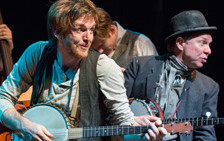If you think small town America was a kinder, gentler place, simpler and more innocent in the early years of the 20th century, think again. Pick up a copy of Spoon River Anthology.
Published in book form in 1915, Edgar Lee Masters’ collection of short, free-verse poems pulls the lid off the collective coffin of a small town in the midwest through a series of candid post-mortem autobiographical ‘epitaphs’ in which 244 former citizens of the fictional Spoon River reveal the truth about their secret lives with the searing honesty made possible without fear of reprisals and consequences.
Many of the autobiographical confessions of the deceased citizens buried in the cemetery on the hill are intertwined by hidden threads. The community portrait reveals life as it was lived in all its mundane glory — complete with its joys and sorrows, loves and betrayals, dreams and frustrations, accomplishments and disappointments, petty intrigues and conflicting social values.
Inspired by the great 19th American poet Walt Whitman, Spoon River Anthology brings to mind the work of Carl Sandburg and Sherwood Anderson (Winesburg, Ohio) and anticipates Thornton Wilder’s Our Town. Spoon River, however, has a naturalist edge missing from the latter’s nostalgic dreamscape of small town New England.
Masters’ lyrical classic has received many theatrical and musical adaptations over the years including Charles Aidman’s 1963 stage version which is still performed today.
The most recent stage adaptation is Spoon River, Soulpepper theatre’s musical created by founding artistic director Albert Shultz, who directs, and on-stage musical director Mike Ross, who composed and arranged the music.
At only 90 minutes of stage time, without intermission, it’s amazing how much of Spoon River is portrayed through 19 male and female actors, most of whom assume multiple roles and play acoustic instruments (guitar, banjo, mandolin, fiddle, bass drum, standup bass, harmonica and piano, in addition to various brass instruments).
The cast recites the vers libre with deep feeling; resonant emotion lingers. The range of fine voices is exceptional, whether as soloists or in a variety of harmony configurations.
Shultz’s direction is direct and immediate, uncluttered and barebones, reflecting the stage set. He never gets in the way of Masters’ poetry. And Ross’ musical composition is best described as folk operetta, reminiscent of the homegrown musicals that defined Canadian theatre in the 1970s and 1980s by such composers as John Gray and John Roby. You don’t leave the theatre humming a tune, but with a warm glow that results from melodic lines that please both ear and heart.
The Toronto-based theatre reprised Spoon River because of its popularity which is abundantly self-evident. It offers a warm, high spirited, heartfelt evening of musical entertainment with a rich soulfulness that expresses the timeless and universal essence of life. Catch it if you can. You will not be disappointed — and bring a hanky.
Spoon River continues to the end of November. Information and tickets are available at http://www.soulpepper.ca


